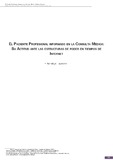El Paciente Profesional informado en la Consulta Médica: Su Actitud ante las estructuras de poder en tiempos de Internet

Voir/
Date
2016-09Auteur
Palabras Clave
Médico, Paciente informado, Internet, PoderDoctor, Patient Informed, Internet, Power
Metadatos
Afficher la notice complèteRésumé
La relación médico-paciente se ha caracterizado, desde el inicio de la práctica clínica, como una relación de poder. El paciente es el sujeto pasivo, mientras que el profesional de la salud es quien ostenta un poder que le ha sido proporcionado a través de los tiempos por respeto a sus conocimientos. Sin embargo, el mundo interconectado de hoy ha dado paso a una nueva generación de pacientes pues principalmente aquéllos con cierta formación académica acuden a Internet, se informan y obtienen un conocimiento sofisticado y actualizado acerca de su enfermedad, aclaran sus dudas en la Web, consultan en foros y grupos online, e incluso desafían al médico con conocimientos precisos. En tal sentido, desde la perspectiva de Foucault, se busca explorar la actitud del paciente profesional informado en la consulta médica y su relación con las estructuras de poder. Fueron entrevistados cuatro médicos que han atendido en su consulta pacientes informados. Se encontró que aunque el paciente aspira tener el poder, en el acto médico el discurso oficial es el que prevalece, porque aunque éste es más participativo, no tiene la decisión final en cuanto a la terapéutica a seguir. Se recomienda continuar en esta línea de investigación, observar qué información extrae el paciente informado de la Internet y qué decisiones toma cuando no acude a la consulta y la relación médico-paciente no tiene lugar.
Colecciones
Información Adicional
| Otros Títulos | Lilies the patient professional informed the medical consultation: Their attitude toward the structures of power in times of Internet |
| Correo Electrónico | norelkys@ula.ve, norelkyse@yahoo.com |
| ISSN | 0798-3069 |
| Resumen en otro Idioma | Since the beginning of clinical practice, the doctor-patient relationship has been characterized as a relationship of power. The patient is the passive subject, while the health professional is the one who holds a power that has been provided through the ages out of respect for his knowledge. However, today’s interconnected world has given way to a new generation of patients because mainly those with a certain academic background go to the Internet, are informed and get a sophisticated and updated knowledge about their illness, clarify their doubts on the Web, consult In forums and online groups, and even challenge the doctor with accurate knowledge. In this sense, from the perspective of Foucault, it seeks to explore the attitude of the professional patient informed in the medical consultation and its relationship with power structures. Four physicians who interviewed patients were interviewed. It was found that although the patient aspires to have the power, in the medical act the official discourse is the one that prevails, because although this one is more participatory, it does not have the final decision as to the therapeutics to follow. It is recommended to continue in this line of research, to observe what information the informed patient extracts from the Internet and what decisions he makes when he does not go to the consultation and the doctor-patient relationship does not take place. |
| Colación | 188-193 |
| Periodicidad | Cuatrimestral |
| País | Venezuela |
| Publicación Electrónica | Revista Fermentum |
| Sección | Revista Fermentum: Artículos |





